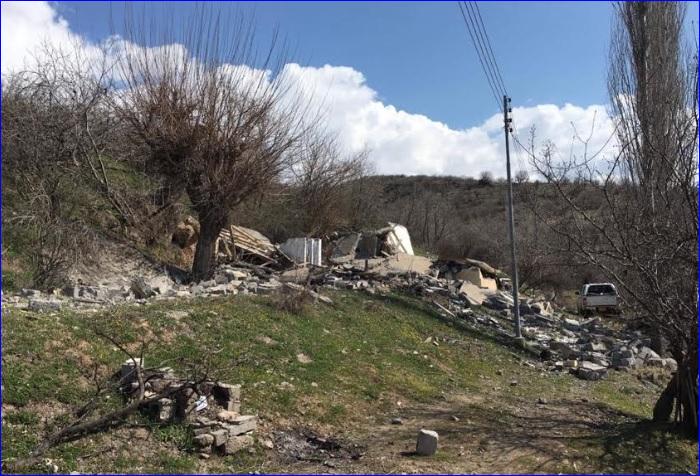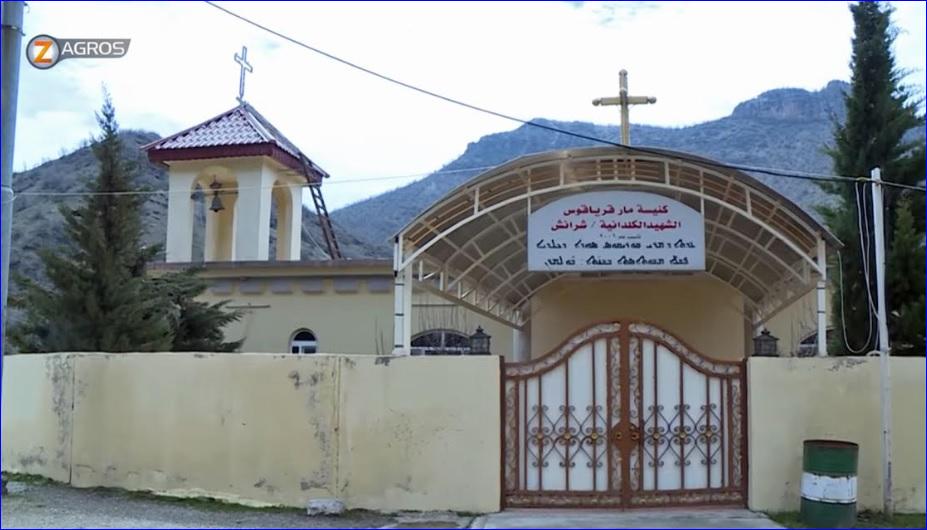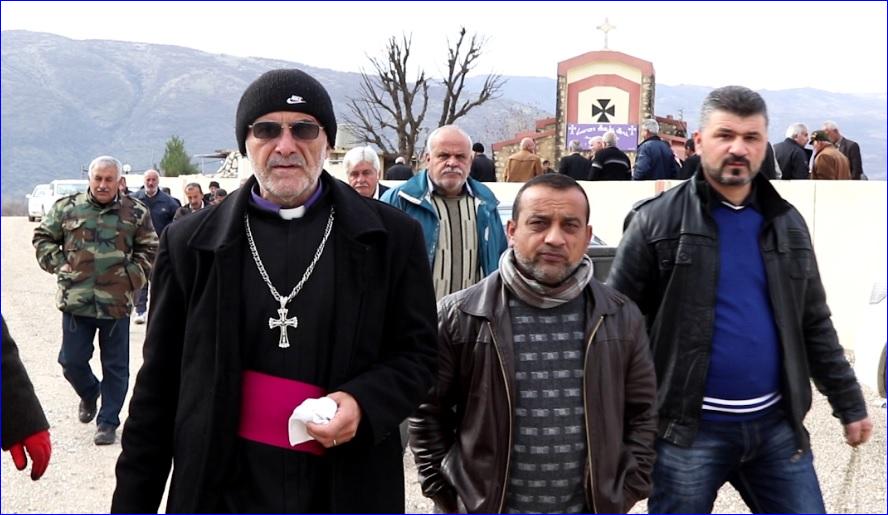


It happened in Tashish, a Christian village in Iraqi Kurdistan, near the Turkish border, at nightfall and in the usual way.
First, the buzzing of the drones was heard and it did not take long, the thunderous and horrendous detonation of the two bombs dropped by a Turkish plane. With absolute certainty, he was one of the F16 fighters or the F4 Phantom II that Ankara has active while imploring the Americans to provide his desired F35.
The missiles struck in a very precise way in one of the houses of the Christian village. The shock wave caused damage in more than one hundred meters to the round and the shrapnel and the metal splinters projected against all the houses of the surroundings, biting the outer walls and leaving big notches in the formwork so that the memory never is lost of what happened at 10.37 at night, local time, on April 11, 2019.
In the pictures taken the next morning, the lethal destructive power of these weapons is seen in all its magnitude. The building-one of those bright, one-story little houses that rise above the shady orchard of the hills of the Barwari Bala valley -was reduced to a mountain of twisted iron, large blocks of reinforced concrete and broken concrete slabs. A few meters from the house, the perforations and dents of the pick-up of the Kurdish militiamen who 'squatted' the house are intuited.
Nobody wants to talk about it, but that someone died is taken for granted . How could someone have survived such an explosion? The Turks know well the objectives of their so-called "war against terrorism". That has to be granted.
Attending, exactly, to the 'surgical' accuracy of their air attacks and the meticulous information they obtain thanks to their drones and their intelligence services it is possible to conclude that the Turks did not ignore that the night of that bombardment there were eight civilians in the town. All of them were Chaldean-Assyrian Christians , oblivious to the pulse that the Turkish Government of Erdogan holds in Iraq against the Popular Defense Forces (HPD, according to its Kurdish acronym), armed wing of the Kurdistan Workers' Party (PKK), around which the bulk of the Kurdish secessionists from Turkey gather.
It was providential that there were no civilian casualties: the few Christians who resist in the valley dined shortly before twilight in two courtyards near the building that the missiles hammered. Twenty meters from the blast site, a family of four was talking. As it has been common, they waited at dawn and left scared of the small town. The night had been long.

Turkish artillery bombs Christian villages
Just one day earlier, on April 10, Erdogan's artillery had bombarded the town of Sharanish, another Chaldean-Assyrian enclave located near the Turkish border, in the Kurdish-Iraqi district of Zakho, about fifty miles east of Tashish, and northeast of Dahok. Both its Muslim and Christian neighborhoods were devastated by the projectiles.
Sending Sharanish mission fighter-bombers or beating him with artillery has been a long tradition since, a few years ago, the Kurd militia of the HPD, at war with Turkey, left the high and steep snowy peaks of the Zagros to seek refuge among the civilians who occupy the hidden valleys of one of the wildest and most uninhabited borders of the planet.
Kurds "kind" but armed: they use Christians
In a systematic way, Christians have been used by the guerrillas as human shields. It is an open secret that they stand in their villages to avoid, without success, the attacks of the Turks.

"They are kind, that's true, " a Christian from the Nahla Valley tells us, while imploring us to identify him with the nickname of Saad Matey. " They are as kind as can be someone who holds a kalashnikov. It is also true that there have never been problems of coexistence and, unlike the Barzani peshmerga [the Kurdish armed forces that operate in the Noriequen territories], they always pay for what they take and interact politely with us. Of course, that is not the real issue. The point is that we are not a judge or part of a foreign conflict, and nobody has ever asked us if we want to live in a militarized zone or in peace. and oblivious to a struggle that does not concern us and that is forcing us to abandon one of our last Iraqi enclaves. "
Christians have been trapped with the rest of Iraqis in the crossfire of a war that is not theirs.
No one in Iraq needs the Islamic State to turn their lives into hell. These types of situations have often been silenced by the great reports about the criminal activities of Daesh.
Unlike what usually happens in other parts of Iraq, such as Bajdida or Erbil, the bulk of NGOs, humanitarian organizations and Christian charities operate on the border . It remains 'terra incognita', an opaque blur whose precise location ignores, in a literal sense, even large maps.
A wild border with mini-guerrilla states
"Look at our house," laments a countryman from the town of Sharanish interviewed by a local television station while showing the shrapnel notches, the vain busts and the cracks of the walls of a house hit by the shock wave of the bombs. artillery. "We were around eighty families. Then, that number fell to twenty, and later, to eighteen , and so on until everyone, Muslims and Christians, left for fear of being busted or buried in the rubble. "
Almost the entire border strip has been occupied in progressive waves by small groups of Kurdish guerrillas attached to the HPD (or PKK) that NATO, EU and Turkey still have today as terrorists. Some of the fiefs that the guerrillas have in places like Sinyar or Qandil are real proto-states beyond the control of the Erbil governments (of Kurdish-Iraqi autonomy) or Baghdad.
The Kurds often crossed the Zagros mountain range, coming from Turkish Anatolia, to get away from Turkey. Of course, gradually, small groups of them left their holes in the rocks to descend to the populations that mark the border. One of the last occupations took place in the Nahla Valley, four years ago.
It was as of that moment when the Government of Turkey stopped settling for illegally invading Iraqi airspace to displace several contingents of replacement soldiers . With the acquiescence of the Kurdish leader Masud Barzani, the first president of Iraqi Kurdistan, the different Turkish units of the Komando were quartered in positions of tactical importance from where they control the natural steps of the guerrilla and from where they strike indiscriminately anyone who is in the immediate vicinity of the guerrillas, even if, as it almost always happens, it is against their own will.
Sharanish is one of the Chaldean-Assyrian peoples most punished by Turkish bombs . What happened in that small town is a good example of the process that is about to end Christians, in this case, without stenographers. Today there is no one who goes to pray to any of his two churches; one belonging to the Chaldeans (Catholics) and the other, built in the 4th century on an old synagogue, by the Eastern Church (Nestorian, or "of the Persians"). In Antiquity, all its population was Jewish, before its conversion to Christianity.
Descendants of the Turkish genocide a century ago
Like other valleys ravaged by Turkish bombs such as Nahla, most of its inhabitants descend from the survivors of the Assyrian-Greco-Armenian genocide of a century ago in Turkey. They arrived, originally, from Turkey, where the Christians were literally exterminated by Kurdish tribes under Ankara, during the First World War.
From their old patriarchal headquarters, located in Kodshanes, their ancestors fled with the almost legendary patriarchs Simon Sea XXI and Agha Patros at the head , to undertake a circular road through Persia that would take them back to the mountains, only from the side Iraqi from their lands. They are the survivors by antonomasia.
Long before the emergence of the Islamic State in the geopolitical scene, the persecution against this minority has been brutal, systematic and often sponsored by the nationalist and supposedly democratic governments of the hostile ecosystem where they live. The jihad to which the Salafist parties appeal is often only an alibi to appropriate their assets.
The same happens against Bartella's babaquíes, who have their own religion, different from Islam, although influenced by it. Or much earlier, in the villages of Nahla. Spiritual differences have often been used to fuel rivalries that, in the end, mask the petty desire to steal their lands. Daesh has been just one of his problems. And not necessarily the biggest one.
On the border of Turkey is another conflict that is settled on the bloody Chaldean-Assyrian sand. It is not religious differences that worries the PKK. In fact, there are Turkish Christians in their ranks from Tur Abdin. They are not, as is usually agreed, an atheist militia, but secularized.
The Kurdish militia paraded in an Assyrian monastery,
Among the buildings occupied by the Anatolian Kurdish militia to hide from the Turkish bombs is the 1,400-year-old Assyrian monastery of Qayoma Mar. As a general rule, Kurdish guerrillas look for uninhabited houses in the heart of the villages, and 'squat' without the opinion of their legitimate owners, who have very little to say about it. In fact, not even complaints have been registered. Could they complain about it? The supposedly temporary occupations against which several Assyrian priests protested have become permanent.
The Kurdish militia at Assyrian funerals
In some villages like Hezaney, the daily coexistence with the militiamen is now daily, and it is possible to see the militia girls , very young, go to a funeral, with their campaign uniforms and without detaching themselves from a moment of their AK47 , to present your respect to the family of the victims. Thanks to the belligerency of Turkey, the guerrillas have indirectly exported their conflict, drawing the violence of the Turkish government of Erdogan towards families completely unrelated to their disputes.
Often, when night falls, from Chaldean-Assyrian populations such as Kanimase (Barwar Valley), it is possible to see in the distance the flashes of Turkish artillery blinking against the cross of the Mar Sawa church.
Aviation raids do not only start, in fact, from Turkey. Also the Iranian neighbors have launched their missiles on the positions of the PKK occupied by Chaldean-Assyrian civilians. They are so accustomed to it that, unless it rains bombs, there is nothing to alter their daily lives. In summer, they gather in the cool to look at the sky, as if they were fireworks.
Article translated from Spanish to English by Google Translate.

or register to post a comment.